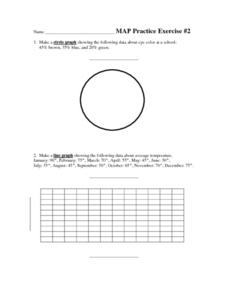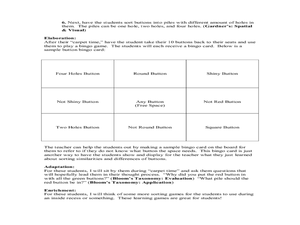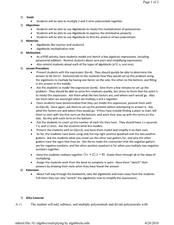Curated OER
Batter Up! Math Stations
Math stations that review important concepts with the real-world example of baseball.
Curated OER
Preparing for the Lewis and Clark Expedition
Here's a instructional activity to help your class envision the Lewis and Clark expedition. Your young historians read a one-page article on the expedition, use context clues and a dictionary to define eight terms from the article and...
Curated OER
Identifying and Using Parallelism and Balance in Literature
Analyze the use of balanced sentences and parallelism in a narrative. Included in this resource is a narrative about serving as a Peace Corps volunteer in Kazakhstan titled, "The Train Ride Home". Middle and high schoolers review...
Curated OER
Solving Applications Using Quadratic Equations
In this solving applications worksheet, young scholars translate word problems to number sentences. They solve the created quadratic equation. This three-page worksheet contains 12 problems.
Charleston School District
Pythagorean Theorem and Converse
You've heard that it is true, but can you prove it? Scholars learn the Pythagorean Theorem through proof. After an overview of proofs of the theorem, learners apply it to prove triangles are right and to problem solve. This is the second...
Exploratorium
Beyond Dominoes: Polyominoes
Dominoes, polyominoes, tetrominoes, and pentominoes are the subject of this interesting math activity designed for middle schoolers. Pupils cut out shapes that are embedded in a worksheet in the plan, and experiment with them by taping...
EngageNY
Polynomial, Rational, and Radical Relationships
This assessment pair goes way beyond simple graphing, factoring and solving polynomial equations, really forcing learners to investigate the math ideas behind the calculations. Short and to-the-point questions build on one another,...
02 x 02 Worksheets
Inverse Functions
Young mathematicians look for patterns in inverse functions as they relate to the original functions. The comprehensive instructional activity emphasizes vocabulary throughout as well as algebraic and graphical characteristics of the...
Illustrative Mathematics
Shape Hunt Part 2
Shapes are everywhere in the world around us, from rectangular doors to the circular wheels of a car. The second lesson in this series opens the eyes of young mathematicians to this wonderful world of shapes as they search the classroom,...
K12 Reader
The Louisiana Purchase
Readers are asked to identify the main idea and two supporting ideas in a brief passage about the Louisiana Purchase.
EngageNY
Complex Numbers and Transformations
Your learners combine their knowledge of real and imaginary numbers and matrices in an activity containing thirty lessons, two assessments (mid-module and end module), and their corresponding rubrics. Centered on complex numbers and...
Curated OER
MAP Practice
For this geometry worksheet, students create circle, line and bar graphs using different comparisons of events. There are 24 questions with an answer key.
Creative Educator
Dream Room Design
Junior designers brainstorm the elements that a bedroom might have, such as a bed, television, and dresser. They identify which items are needs and which are desires. They practice measurement skills in the classroom by determining its...
Illustrative Mathematics
Toilet Roll
Potty humor is always a big hit with the school-age crowd, and potty algebra takes this topic to a whole new level. Here the class develops a model that connects the dimensions (radii, paper thickness, and length of paper) of a common...
Beauty and Joy of Computing
Building Your Own Blocks
Isn't building with blocks an activity for toddlers? The third lab of a five-part unit teaches young computer scientists how to create their own block instructions for programming. They use these blocks to create geometric figures, spell...
Curated OER
Grouping Buttons
Looking for a good activity on counting and sorting? This activity is worth a look! In this classification activity, learners sort buttons by color, shape, shiny verses not shiny, or number of holes.
Santa Barbara City College
How to Make a Multiplication Table
Teach children how to make a multiplication table, and they'll be multiplying for life. Following this series of steps, young mathematicians learn to use patterns and the relationships between numbers to create their very own...
EngageNY
End-of-Module Assessment Task — Precalculus (Module 1)
A transformational assessment determines how far pupils are advancing toward mastering complex and matrix standards. The assessment checks the learners' understanding of linear transformations, complex numbers and the complex plane,...
California Academy of Science
Coincidental Colonization
The Galápagos Islands are an amazing place of isolated adaptation, colonized by an interesting mix of plants and animals. The class plays a game to help them understand how these organisms came to live on the island through a combination...
National Research Center for Career and Technical Education
Photoshop Scale
Say cheese! Can your class take a great photo and size it to fit any need? A career and technology-centered lesson plan demonstrates the correct way to resize images in Adobe Photoshop. Scholars view a presentation and work individually...
Curated OER
Clinometer
Seventh graders build their own Clinometer and using the tangent of angles, estimate the height of trees. Then these students develop and lesson to show whole class and determine the tallest tree on school property.
Curated OER
Students Multiply Polynomials
Factor polynomial functions that have two and three terms. Using Algeblocks, your class will create models to show their understanding of these concepts.
Odyssey of the Mind
Odyssey of the Mind Curriculum Activity: From a Distance
Challenge your class with an amazing set of ideas that really put the project back into project-based learning. It all starts with a whole class research task. Each learner will look up and take notes on multiple facets of things that...
EngageNY
Mid-Module Assessment Task: Grade 7 Mathematics Module 3
Lesson 16 in the series of 28 is a mid-module assessment. Learners simplify expressions, write and solve equations, and write and solve inequalities. Most questions begin as word problems adding a critical thinking component to the...

























